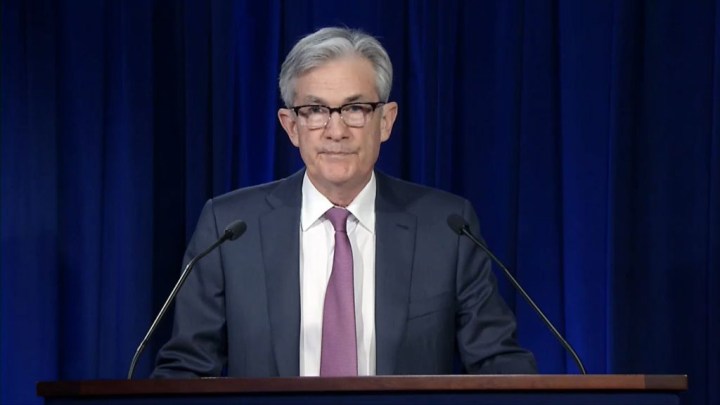
Powell warns of a possible sustained recession from pandemic

Federal Reserve Chair Jerome Powell warned Wednesday of the threat of a prolonged recession resulting from the viral outbreak and urged Congress and the White House to act further to prevent long-lasting economic damage.
The Fed and Congress have taken far-reaching steps to try to counter what is likely to be a severe downturn resulting from the widespread shutdown of the U.S. economy. But Powell cautioned that numerous bankruptcies among small businesses and extended unemployment for many people remain a serious risk.
“We ought to do what we can to avoid these outcomes,” Powell said.
Additional rescue aid from government spending or tax policies, though costly, would be “worth it if it helps avoid long-term economic damage and leaves us with a stronger recovery,” he said.
Powell spoke a day after House Speaker Nancy Pelosi, a California Democrat, proposed a $3 trillion aid package that would direct money to state and local governments, households, and health-care workers. This money would come on top of roughly $3 trillion in earlier financial assistance that the government has provided. The Fed itself has also intervened by slashing interest rates to near zero and creating numerous emergency lending programs.
Yet Trump administration officials have said they want to first see how previous aid packages affect the economy. And Republican leaders in Congress have expressed skepticism about allowing significant more spending right now. Senate Majority Leader Mitch McConnell, a Kentucky Republican, said there is no “urgency” to act.
Powell, though, made clear his concern that a recession may last long enough to cause extensive damage to the economy and make a recovery weaker and slower. In such a scenario, unemployed workers would lose skills and their connections in the job market, making it harder for them to find new employment. And with many small businesses bankrupt, fewer companies would be available to hire the jobless.
“Deeper and longer recessions can leave behind lasting damage to the productive capacity of the economy,” the chairman warned in his prepared remarks before holding an online discussion with the Peterson Institute for International Economics. “Avoidable household and business insolvencies can weigh on growth for years to come.”
He said the Fed would “continue to use our tools to their fullest” until the viral outbreak subsides. He gave no hint of what the Fed’s next steps might be.
But Powell shot down the idea of cutting the Fed’s short-term interest rate, which is now near zero, into negative territory, as central banks in Europe and Japan have done. Such a move would require banks to pay interest on cash reserves that they hold at the Fed. That would be intended to encourage them to lend the money instead. Yet negative rates appear to have done little to stimulate the economies of the countries that have adopted them.
President Donald Trump, who has frequently expressed his desire for the Fed to adopt negative rates, tweeted Tuesday that “as long as other countries are receiving the benefits of Negative Rates,” the U.S. should also implement them.
“I know there are fans of the policy,” Powell said. But “this is not something that we’re looking at.”
The chairman argued that negative rates would likely hurt the banking industry, and he noted that all Fed policymakers had expressed opposition to negative rates during their last discussion of them in October — a rare show of unanimity among all 17 officials.
He repeated his previous warnings that the Fed can lend money to solvent companies to help carry them through the crisis but that a longer downturn would likely bankrupt some previously healthy companies without more help from the government.
Powell’s downbeat view contrasted with a speech Monday by Charles Evans, president of the Federal Reserve Bank of Chicago. Evans sketched a more upbeat outlook and suggested that “it’s reasonable to assume a legitimate return to growth in the second half” of this year and into 2021
There’s a lot happening in the world. Through it all, Marketplace is here for you.
You rely on Marketplace to break down the world’s events and tell you how it affects you in a fact-based, approachable way. We rely on your financial support to keep making that possible.
Your donation today powers the independent journalism that you rely on. For just $5/month, you can help sustain Marketplace so we can keep reporting on the things that matter to you.












